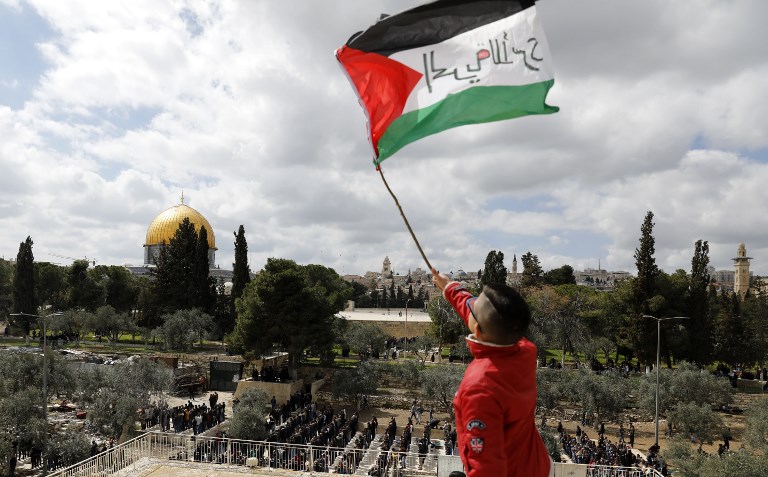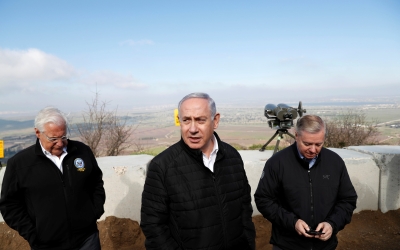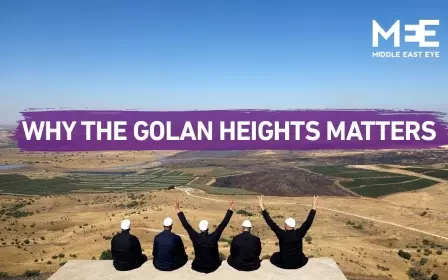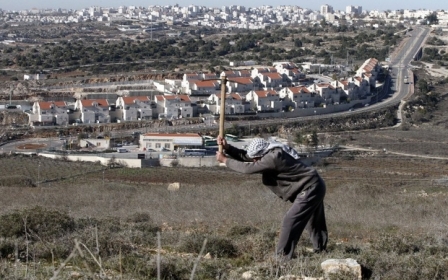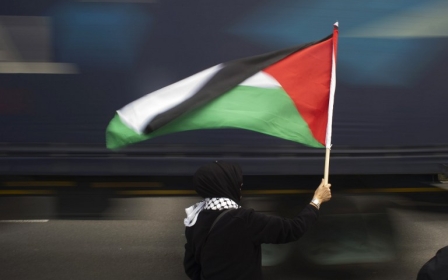Why the US decision about Golan Heights, West Bank and Gaza is dangerous
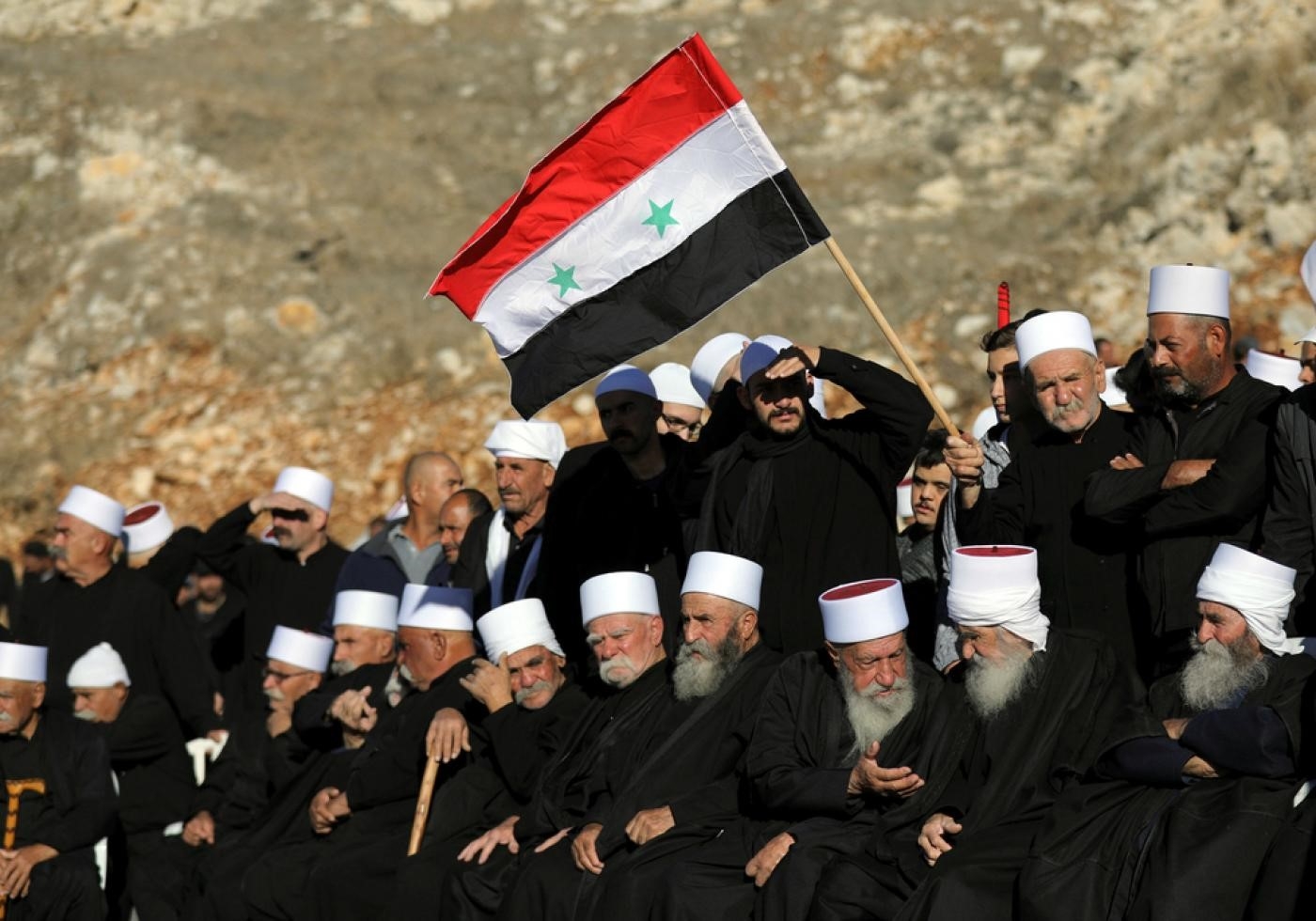
Druze Arabs on the Israeli-occupied Golan Heights hold an anti-election protest outside a municipal polling station in Majdal Shams (Reuters)
The US government’s decision to drop the word “occupied” in referring to the Golan Heights, West Bank and Gaza Strip comes as an extension of US policy under President Donald Trump, who has adopted the positions of Israeli Prime Minister Benjamin Netanyahu’s rightwing government entirely.
Last year, Trump moved the US embassy to Jerusalem and recognised the city as the capital of Israel. He froze US aid to the Palestinian refugee agency, UNRWA, and demanded a redefinition of Palestinian refugee status by excluding new generations, which would reduce the number of refugees from more than five million to around 40,000.
Expanding settlements
The Trump administration also decided that the continuous expansion of Israeli settlements was not an obstacle to the peace process, knowing that the US ambassador to Israel, David Friedman, is a major supporter of the settlement enterprise.
In addition, the US closed the Palestine Liberation Organisation office in Washington and froze US aid to Palestinians, estimated, according to OECD data, at nearly $7.3bn from 1993 to 2017.
New MEE newsletter: Jerusalem Dispatch
Sign up to get the latest insights and analysis on Israel-Palestine, alongside Turkey Unpacked and other MEE newsletters
In this vision, the Gaza Strip is separated from the West Bank, and Palestinian communities are turned into scattered enclaves
It did not end there. The US government enacted laws to prohibit providing funds to the families of Palestinian political prisoners and individuals killed by Israel, under the pretext of “fighting terrorism”.
It also considers any form of criticism of Israel to be anti-semitic, including the boycott, divestment and sanctions (BDS) movement, which is a legal and peaceful form of protest.
These developments are part and parcel of how the US assumes it will deal with the Palestinian issue: through the removal of political solutions based on the Palestinian people’s right to self-determination, in accordance with international law and resolutions.
The Golan Heights: Why it matters
+ Show - HideOfficially part of Syria since the country’s independence in 1944, the Golan Heights is a strategic plateau straddling Israel and Syria and overlooking southern Lebanon.
It was captured by Israel during the Middle East war of 1967 and subsequently annexed in a move never recognised by the international community.
The Golan is recognised as part of Syria by the United Nations. UN Resolution 242 calls for Israel to withdraw from the Golan and other occupied territories including the Gaza Strip and the West Bank.
However, Israel has repeatedly refused to do so and in 1981, it formally annexed the Syrian territory.
A UN peacekeeping force has patrolled the demarcation line between Syrian and Israeli-controlled areas of the Golan since 1974.
Israel has constructed settlements that are illegal under international law in the occupied territory and settled its citizens there.
Some 20,000 Israeli settlers currently live in the Golan, alongside around 26,000 of the territory’s native inhabitants, who are predominantly Druze and identify as Syrian.
Since the Syrian war erupted in 2011, Syrians in the Golan taking Israeli citizenship has become more common, though the vast majority reject it.
The Golan is thought to provide around one-third of Israel's fresh water supply. Water from the territory flows into the Sea of Galilee and Jordan River.
Other than its strategic significance - the Golan is the only land border between Israel and Syria - the territory is also used by Israelis for leisure purposes. The area counts an Israeli ski resort and several vineyards.
The US aims to replace such plans with Netanyahu’s vision for the conflict - that is, to find humanitarian solutions based on economic peace for Palestinian residents. In this vision, the Gaza Strip is separated from the West Bank, and Palestinian communities are turned into scattered enclaves. The goal is to eliminate the foundations of Palestinian national identity.
‘Deal of the century’
As the Trump administration’s plans become apparent in accordance with the yet-to-be-announced “deal of the century”, and as the Palestinian people’s right to self-determination is undermined, Arab-Israeli relations are undergoing a process of normalisation to bypass the 2002 Arab Peace Initiative announced in Beirut.
The initiative offered normalised relations with Israel, provided that it withdrew from the Palestinian territories occupied in 1967, and enabled the establishment of a Palestinian state on those lands. At the recent Warsaw summit, the path for Arab-Israeli relations was forged through the creation of a common “enemy”, Iran - part of misleading Zionist propaganda that sees a joint Arab-Israeli interest in confronting the “Iranian threat”.
The goal, however, is really to create a smokescreen and provide Israel with an opportunity to enter and dominate Arab markets and resources.
While Iranian-Arab differences and disagreements cannot be ignored, they can be solved through negotiation and dialogue. This can be achieved in a manner that safeguards the interests of all the parties within an orderly framework - on the basis of not interfering in the internal affairs of the countries involved - and that maintains respect for their sovereignty, interests and wealth.
If this is achieved, the main threat remains the Israeli occupation, which aims to become a major military and economic force that can control the region.
Flouting international law
The US decision to remove the word “occupied”, in violation of international law and UN resolutions, gives the Israeli government ample scope to widen its settlement project. This will allow for the confiscation of more land, the transfer of residents and the elimination of any chance for a Palestinian state, paving the way for the official annexation of the Palestinian territories by Israel.
The recent US decisions on Palestine, not to mention other global issues, are not surprising. Trump does not believe in the rules of international law, codified after the Second World War.
Instead, he believes, as colonisers did, that military and economic tools alone are effective in international and domestic political equations, without regard for mutual interests or the principles of international law and human rights, including the right to self-determination.
In this context, the US decision to drop the word “occupied” not only undermines the foundations of international law regarding the occupied territories, but it adopts the Zionist narrative, which describes these lands as a “historic and religious right” for the Jews.
It also cements the denial of Palestinian and Syrian rights, aiming to tear apart the historical ties of the original residents with their land. This decision gives legitimacy to the occupation by allowing it to do as it pleases with these lands, without accountability.
It gives the reins to the settlement frenzy, imposing new facts on the ground in violation of UN Security Council Resolution 2334, which condemns settlements - and it paves the way for possible annexation of these lands by stating that they fall under “Israeli control”.
How will Palestinians respond?
This decision strikes at the basis of all initiatives calling for a two-state solution, including the Arab Peace Initiative. It works to prepare public opinion for Israel’s solution to the occupied territories, which is based on the administration of the people without the land, dispossessing Palestinians and disregarding refugees’ right of return.
Finally, the decision works to “legislate” the transfer of the US embassy to Jerusalem - and the recognition of the city as the capital of the occupation’s state - by excluding Jerusalem from being considered part of the occupied territories.
Palestinians must formulate a plan to confront this based on the Palestinian narrative, which must become relevant again on an Arab and international scale
In the face of this reality, and amid the inherent dangers of the US decision, Palestinians must formulate a plan to confront this based on the Palestinian narrative, which must become relevant again on an Arab and international scale.
It is also necessary that the nature of the conflict is highlighted: that it requires national liberation based on international resolutions to fight settler-colonial, Zionist, discriminatory policies - policies that are supported by the US government.
The views expressed in this article belong to the author and do not necessarily reflect the editorial policy of Middle East Eye.
Middle East Eye delivers independent and unrivalled coverage and analysis of the Middle East, North Africa and beyond. To learn more about republishing this content and the associated fees, please fill out this form. More about MEE can be found here.



